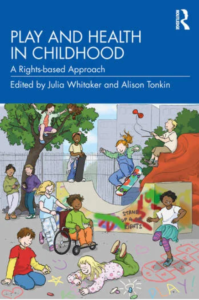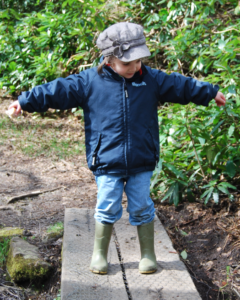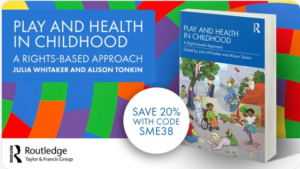by Julia Whitaker and Alison Tonkin
 When we think about play, we think of ‘fun’, ‘pleasure’, ‘imagination’ – maybe even ‘joy’. In our schools, we talk about ‘making learning fun’, ‘playful learning’ and ‘learning through play’. In our hospitals, play specialists, play workers, clown doctors and volunteers promote play as a bridge between the hospital and the world outside. In the community, children’s charities and Arts organisations use play to inspire curiosity, wonder and joyfulness in children’s lives. This association of play with positive emotion has often led to the misperception that play is all sunshine and rainbows, smiles and laughter, light-hearted and therefore frivolous. Play can certainly be all these things – fun, pleasing and enjoyable – but it is also a very serious matter.
When we think about play, we think of ‘fun’, ‘pleasure’, ‘imagination’ – maybe even ‘joy’. In our schools, we talk about ‘making learning fun’, ‘playful learning’ and ‘learning through play’. In our hospitals, play specialists, play workers, clown doctors and volunteers promote play as a bridge between the hospital and the world outside. In the community, children’s charities and Arts organisations use play to inspire curiosity, wonder and joyfulness in children’s lives. This association of play with positive emotion has often led to the misperception that play is all sunshine and rainbows, smiles and laughter, light-hearted and therefore frivolous. Play can certainly be all these things – fun, pleasing and enjoyable – but it is also a very serious matter.
Putting the ‘serious’ back into play
The Ancient Greeks were among the first to recognise that play is indeed a serious affair – not just the best way for children and adults to learn, but fundamental to human nature and development. The Indigenous peoples of the Americas and the Pacific Nations regarded children’s play as a way of ‘knowing and being’, essential for their continued survival and development. In Europe, in the Middle Ages, adults were held responsible for creating opportunities for children to play because it was seen as so important. In the 17th century, philosopher John Locke advocated for children’s play to be taken seriously as a source of learning and personal development, and, in the 18th Century, Jean-Jacques Rousseau promoted the idea that play provides opportunities for the ‘experiences and reflection’ necessary for growth. This conceptualization of play was to become the inspiration behind the child-centred approaches to self-directed learning and development espoused by Pestalozzi, Montessori, Piaget, Froebel, and Steiner.
The introduction of compulsory schooling in Europe between the 17th and 19th centuries rescued children from the toils and troubles of an early working life which had been accelerated by increasing industrialisation and the urbanisation of society. But, at the same time, the standardisation of children’s education replaced the child’s way of ‘knowing and being’ through ‘experiences and reflection’ with adult-determined, adult-imposed instruction. In the process, the status of play was undermined and devalued, and it ceased to be the serious matter recognised since ancient times. Play was pushed to the sidelines, no longer seen as the essential component of development it once was. It became just a way for children to let off steam and release surplus energy, in order for them to be able to focus on their lessons and domestic and religious duties.
Play and health – the dream team!
 In our new book, ‘Play and Health in Childhood: A Rights-based Approach’ published by Routledge on September 8 2023 and officially launched in Edinburgh on September 29, we set out to put the ‘serious’ back into play, and to show that having fun, experiencing pleasure and knowing joy are crucial to a child’s health and development. This premise is firmly rooted in the UN Convention of the Rights of the Child, which identifies play as one of 43 ‘active’ rights that belong to all children up to the age of 18, irrespective of who they are or where they live. The Convention also declares that children have the right to the ‘highest attainable standard of health’ (UNICEF 2016) and in this book we have made ‘play’ and ‘health’ the dream team, demonstrating that in the true spirit of universality and indivisibility, you cannot have one without the other as it is through play that each child grows and flourishes to live their best possible life.
In our new book, ‘Play and Health in Childhood: A Rights-based Approach’ published by Routledge on September 8 2023 and officially launched in Edinburgh on September 29, we set out to put the ‘serious’ back into play, and to show that having fun, experiencing pleasure and knowing joy are crucial to a child’s health and development. This premise is firmly rooted in the UN Convention of the Rights of the Child, which identifies play as one of 43 ‘active’ rights that belong to all children up to the age of 18, irrespective of who they are or where they live. The Convention also declares that children have the right to the ‘highest attainable standard of health’ (UNICEF 2016) and in this book we have made ‘play’ and ‘health’ the dream team, demonstrating that in the true spirit of universality and indivisibility, you cannot have one without the other as it is through play that each child grows and flourishes to live their best possible life.
In Part One of Play and Health in Childhood, we revisit the concepts of play and health in the context of modern childhood and explore what it means to have ‘human rights’. In Part Two, we take each of the UNCRC’s four general principles and examine how play meets each of these in the fulfilment of children’s health. Part Three examines play in the context of home, school, healthcare, and community and concludes with a call for a new social movement for play and health.
Parts Two and Three of the book include contributions from children themselves alongside those of parents and professionals, who have written about the connection between play and health in their own lives and work. These ‘case-stories’ bring home the seriousness of play for children’s lives – from birth right through the teenage years – and animate the accompanying theory and research evidence.
If we really listen to children, they are telling us what they need
 Play and Health in Childhood also explores the policy landscape for play across the UK, both celebrating and lamenting efforts to fulfil our responsibilities as duty bearers for children’s rights, with a particular focus on children’s right to play. Children are asking us to help them fulfil their desire to be ‘healthy and happy’ and, if we really listen to children, they are telling us what they need – play and plenty of it (Children’s Commissioner 2021). We hope this book will help to promote this wish -the right to play – by starting conversations and prompting subsequent action, through individual endeavours and right up to the corridors of power where the ultimate responsibility of rights bearers lies.
Play and Health in Childhood also explores the policy landscape for play across the UK, both celebrating and lamenting efforts to fulfil our responsibilities as duty bearers for children’s rights, with a particular focus on children’s right to play. Children are asking us to help them fulfil their desire to be ‘healthy and happy’ and, if we really listen to children, they are telling us what they need – play and plenty of it (Children’s Commissioner 2021). We hope this book will help to promote this wish -the right to play – by starting conversations and prompting subsequent action, through individual endeavours and right up to the corridors of power where the ultimate responsibility of rights bearers lies.
Julia Whitaker worked with children and families for many years as a social worker, family therapist and health play specialist. She has been an ardent supporter of Upstart since its inception.
Alison Tonkin has had a range of health and play related roles as a researcher, practitioner and volunteer across the childcare sector and is a staunch advocate of children’s rights, which she has hopefully instilled in the childcare and healthcare students she has taught over many years.
Acknowledgements: Thanks to Lizzy Mikietyn (lizzymikiteyn.com) for the drawing of children on a wall and Julia Whitaker for the photograph of the child in the garden.
References:
Ardley, G. (1967) The role of play in the philosophy of Plato. Philosophy, 42(161): 226–244. Online. http://www.jstor.org/stable/3749078
Children’s Commissioner (2021) The Big Ask: The Big Answer. London: Children’s Commissioner for England.
Cybulskie, D. (n.d.) Childhood in the Middle Ages. Online. https://www.medievalists.net/2018/11/childhood-middle-ages/
Frost, J.L. (2010) A History of Children’s Play and Play Environments. New York: Routledge.
Gray, P. (2016) Children’s Natural Ways of Educating Themselves Still Work: Even for the 3Rs. In: D.C. Geary and D.B. Berch (eds.) Evolutionary Perspectives on Child Development and Education, Evolutionary Psychology. Switzerland: Springer International Publishing. DOI 10.1007/978-3-319-29986-0_3
James, V.A., Dragon-Smith, C., Lahey, W. (2019) Indigenizing Outdoor Play. In: R.E. Tremblay, M. Boivin, R.deV. Peters, and M. Brussoni (eds.) Encyclopedia on Early Childhood Development. Online. https://www.child-encyclopedia.com/outdoor-play/according-experts/indigenizing-outdoor-play
UNICEF (2016) The United Nations Convention on the Rights of the Child. Online. https://www.unicef.org.uk/wp-content/uploads/2016/08/unicef-convention-rights-child-uncrc.pdf
Whitaker, J. And Tonkin, A. (2023) Play and Health in Childhood: A Rights-based Approach. Abingdon: Routledge.


